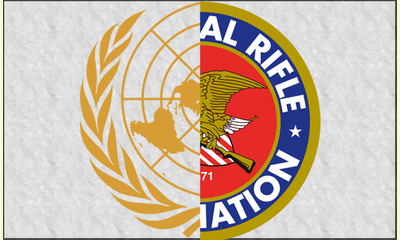|
|
UN Passes Historic Arms Trade Treaty To Media Silence
un articulo por Alexander Zaitchik, Media Matters Blog
U.S. Press Largely Ignores Negotiation, Passage Of
Historic Treaty
On the day the Arms Trade Treaty was scheduled to
face a consensus vote by 193 countries, ending the
years-long process to establish an international
agreement to curtail arms trafficking to nations
torn by conflict, I listened to a member of the
Liberian delegation explain his country's
concerns. "We wanted a much tighter treaty," he
said, referring the large group of African
countries most affected by the global black market
arms trade. "Those of us who live in countries
devastated by civil war very clearly understand
the need for a strong regulatory framework to
deter non-state actors from getting weapons. This
is why we wanted a mechanism for risk-assessment,
and why we wanted penalties."

This graphic, from the mediamatters website, illustrates the opposition to the United Nations by the National Rifle Association
click on photo to enlarge
Without the view from Liberia, it's hard to
understand yesterday's headlines about the General
Assembly's approval of the treaty. Which is why
during two weeks of negotiations last month,
African delegations could often be seen chatting
with media from around the world. On the last day
of the conference especially, the North Lawn
building buzzed with reporters seeking
perspectives. There were Russian and Arab TV
crews, Japanese magazine journalists, and writers
from at least half a dozen African publications.
The U.S. media presence, hailing from the world's
largest arms exporter, was harder to find. Which
is to say, it was nearly impossible to find.
In two weeks of commingling with ATT delegates and
observers, the only American reporters I met were
Ginny Simone, the face of NRA News, and Richard
Johnson, a freelancer who has covered the U.N.
since Brezhnev, most recently for an obscure
website called South-South News. "In terms of
media, it's gotten pretty sleepy around here,"
said Johnson, before recounting the glory days of
the 1970s. "Now it's more about Twitter than press
conferences. The institutional media only flocks
when North Korea does something, or there's drama
in the Security Council."
This lack of media presence was reflected in the
pages of the nation's largest newspapers, which
largely ignored the treaty negotiations. The
Washington Post was a no-show. So was The Wall
Street Journal. The Los Angeles Times reported
from the West Coast on a State Department press
release and published a story on the treaty's
passage credited to "Times Staff and Wire
Reports."
Lapping the field, The New York Times published
three full-length reports with a U.N. dateline,
two news briefs, and a table-setting piece at the
start of the treaty conference. The paper benefits
from investing in a full-time UN beat reporter,
Neil MacFarquhar, as well as a New York-based
foreign desk writer who covers the body, Rick
Gladstone; the LA Times, by contrast, dispatches a
New York-based reporter when they deem it
necessary.
None of the major broadcast networks appear to
have found the treaty worthy of even a passing
mention on their airwaves. Nor did CNN, the cable
network historically most interested in world
news. The only major cable news channel to show up
was Fox News, which relied so heavily on NRA
talking points for its anti-treaty coverage that
the dishes on its sat-truck outside the UN gate
reminded one of turrets on an enemy tank.
(This article is continued in the discussionboard)
|








|
DISCUSSION
Pregunta(s) relacionada(s) al artículo :
Do the mass media give any attention to the culture of peace?, or just to the culture of war?
* * * * *
Comentario más reciente:
:
The articles from Africa describe good examples, among the rare ones, of media attention to the culture of peace. Not by accident that it is in Africa. In fact, the countries of the North have traditionally tried to keep the countries of the South from having their own media. For some history, see the history of UNESCO's attempt to aid the media of the South.

|
|









